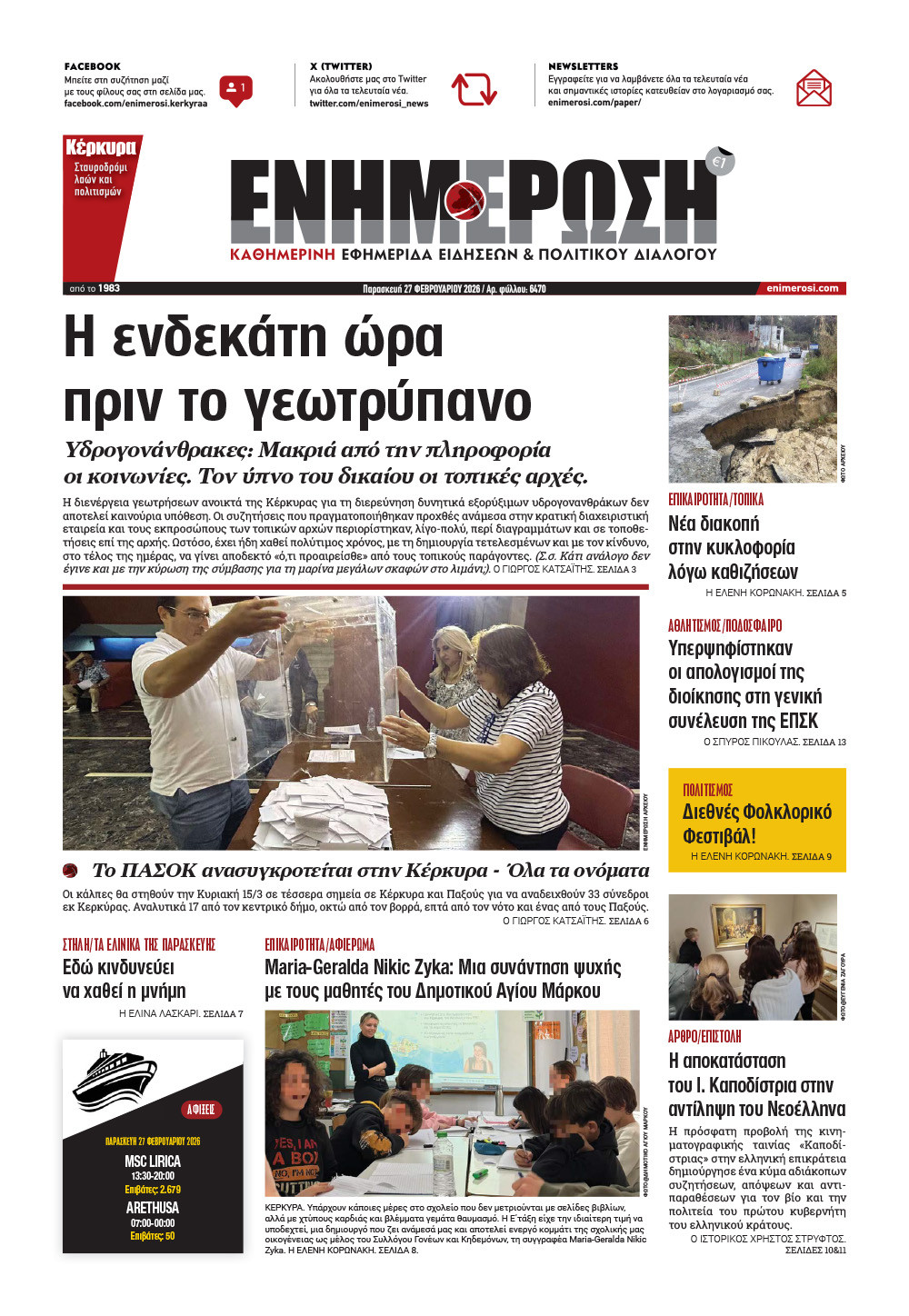Urgent call for protection of marine and island environment from cruise ships

CORFU. At the General Assembly of the European Network of Island Chambers of Commerce iNSULEUR, Spyros Spais said there is a need to adapt port facilities to the new requirements for providing electrical energy support to vessels during their stay in ports.
The serious issue of protecting the marine and island environment from the numerous coastal shipping vessels, commercial ships, and cruise ships, as well as the pollutant emissions from their conventional engines, was brought to the attention of the General Assembly of the European Network of Island Chambers iNSULEUR by Spyros Spais, a board member of the Corfu Chamber of Commerce.
The issue also affects Corfu, due to the significant number of cruise ships, with around 500 cruise ships expected to arrive at its port in 2024, many of which are of huge dimensions and passenger capacity, in addition to the ferry boats.
At the working meeting on "The Cohesion Policies of the EU Island Economies for the period after 2027," organised jointly by INSULEUR, the European Economic and Social Committee, the European Small Islands Network (ESIN), and the EU's Directorate-General for Regional and Urban Policy (CPMR), in Brussels on May 28, it was stated that the problem is not only specific to Corfu or Greece but is pan-European.
Need for discussions
According to Mr. Spais, this is an issue that has not been highlighted until now. His goal, beyond informing and raising awareness among the stakeholders at the European level, is to begin discussions on the matter and the need to modernise the fleet with new technology ships. He also stressed the necessity of adapting port facilities to the new requirements for providing electrical energy support to vessels during their stay in ports.
In his presentation, Mr. Spais highlighted that the cruise industry is a significant part of the tourism sector in Greece and Europe, contributing significantly to the economy and employment. However, he pointed out that the ferry lines connecting the islands with the mainland on a daily basis undoubtedly contribute to environmental pollution. He clarified that ferry boats stay in ports for an average of 2 to 4 hours, unlike cruise ships, which have an average port stay of 10 to 12 hours.
In ports that lack facilities for providing electrical energy to connect and continuously supply the ships, vessels are forced to run their engines to meet their needs. This results in constant emissions, creating a cloud of pollution in the surrounding area. The consequences of this pollution are certainly detrimental to the health of the residents.
500 Cruise Ships in Corfu
With regard to Corfu, he said: "In 2024, around 500 cruise ships are expected to arrive at its ports—many of which are of huge dimensions and passenger capacity—in addition to the ferry boats. This demonstrates the particularly high activity of its port.
Therefore, there is a corresponding environmental burden due to the emissions from these vessels. However, the problem is not only specific to Corfu or Greece, but it is pan-European," he noted, pointing out that steps are being taken towards the green propulsion of ships, albeit slowly. "For example, the Ellen, the world's most powerful 100% electric ferry, connects two islands in Denmark without producing noise or smoke. Norway, Italy, and other countries are also moving towards electric propulsion for their ships. However, the transition to green energy for ships has a high construction cost and will take many years to complete. If it is ever completed."
Proposals
In the context of his presentation, he submitted proposals to expedite the aforementioned processes, which include:
-
Financial tools from the European Union for the electrification of European ports with 100% subsidised programmes.
-
Financial programmes with 100% subsidy for transforming old ships into hybrid ones.
-
Financial programmes with 100% subsidy for the purchase of new hybrid ships.
"It is clear that the above financial tools should be adapted to the needs of each member country of the European Union," Mr. Spais said. "I hope that this issue, concerning the environmental protection and health of the residents of island and coastal—port—areas, will receive the appropriate interest and the necessary response from EU services."
To further support his statements about the environmental burden on Corfu and other areas from the cruise ships that are stationary for several hours and continuously operating, he provided indicative photos from various ports in Greece. Both the representatives of the agencies and the responsible EU directorate committed to examining the issue.
MARIA BAZDRIYIANNI












